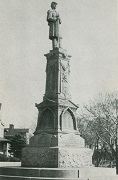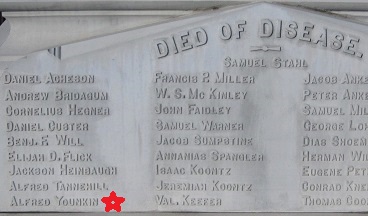
|
Alfred
Younkin |
|
|
|
Civil War monument, Somerset, PA |
Alfred Younkin was born on Feb. 7, 1840 in Turkeyfoot Township, Somerset County, PA, the son of Henry F. and Mary (King) Younkin.
He was a pioneer of Kansas and a casualty of the Civil War.
As a teenager in the mid-1850s, he migrated westward with his older brother Moses and settled in Clay Center, Clay County, KS. Their brother Harrison, back in Pennsylvania, recalled many years later that "Two of the oldest boys emigrated to Kansas previous to the border ruffian troubles and the Lawrence massacre, in which I think they played some part on the Free Soilers' side. Afterward Moses and Alfred Younkin entered the U.S. service, serving on the frontier and enduring many hardships and privations."
"Free-soilers" were Kansas settlers in the 1850s who wanted to form a new state free from slavery as a backlash of the Kansas-Nebraska Act of 1854. They formed a political party by that name. This led to extensive violence in the territory which led to the rise of abolitionist John Brown and "Bleeding Kansas."
Then during the Civil War, the largely prohibitionist town of Lawrence, KS was attacked and largely destroyed on Aug. 21, 1863 by a band of Confederate guerrillas led by William Quantrill. Known as the "Lawrence Massacre, some 150 residents were murdered, an act considered one of the bloodiest in state history.
Alfred waited nearly three years after the war broke out to enlist in the Army. He was placed within the 11th Kansas Cavalry, Company L. His enlistment date was March 31, 1864, and he was promised a bounty payment of $160, due at the completion of his service.
His brothers Moses, Harrison and Silas also provided military service during the war with Union Army regiments. Brother Silas was wounded in the face and Harrison was shot completely through the chest at the battle of Fair Oaks, VA.
 |
| Political cartoon, "Smoking Him Out," about the highly divisive free soiler movement in Kansas - Library of Congress - Below: Confederate guerillas led by William Quantrill brutally murder citizens of the pro-Union town of Lawrence, KS during the Civil War. Pictorial Battles of the Civil War |
 |
While a member of the regiment, he appears to have been stationed at Fort Kearny, Nebraska, and at Fort Halleck, Wyoming. Then at a post in Colorado, Alfred caught an incurable disease of "bilious fever," also known as "mountain fever." The symptoms included nausea, vomiting, diarrhea and spiked temperatures. The war now over, he and his regiment were headed back to Kansas to be discharged from the army. He could only go as far as as Marysville, Clay County, KS, at a point where he could endure the travel no further. Wrote his fellow soldiers John Hour and George B. Himes: "He was so bad when we came to Marysville, Kansas, that we left him there and went on to Fort Leavenworth...."
Sadly, he died in Marysville on Sept. 15, 1865 at the age of 25 years, seven months and eight days, considered a casualty of the conflict even though it had ended by the time of his demise. His remains were placed into rest at the Timbercreek Cemetery near Wakefield, Clay County. In an obituary, the Marysville Enterprise said that "Some members of his company who have been with him during his illness here, and a few of the Massachusetts 3d, who have adjourned here for a few days, gave him a respectable interment in our cemetery. Sleep, brave soldier, sleep; your labors for your country and yourself are over, and you are lulled to rest after the mighty struggles, in which you bravely fought, are ended in bright victory." The obituary was republished in the Junction City Weekly Union.
 |
| Above: Fort Kearny, NE, where Silas served for a time during the Civil War (Wikipedia/Library of Congress). Below: a restored stockade wall today (Library of Congress) |
 |
Some years later, Alfred's death was described in his father's Somerset Herald newspaper obituary as “in the service on the western frontier.”
When a monument honoring Civil War soldiers was erected in Somerset, Somerset County, Alfred's name was among 203 names inscribed on the face of the statue under the heading of "Died of Disease." The monument was cast in bronze and dedicated on Sept. 17, 1888 by surviving soldiers and local citizens in a ceremony attended by 5,000 observers. Funds for the effort were raised by members of the R.P. Cummins Post of the Grand Army of the Republic, a Union veterans lobbying organization.
Nearly three decades after the war, now living in Kansas, Alfred's aged mother applied for and on Oct. 25, 1894 was awarded a federal pension as compensation for her loss. [App. #603.672, Cert. #424.026]
|
|
|
Civil War monument bearing Alfred's name in Somerset, PA |
Copyright © 2014-2016, 2019-2024 Mark A. Miner |
Research for this page graciously shared by the late Donna (Younkin) Logan, Marian (Smith) Posey, Laurel Posey, Loretta (Adams) Kelldorf, Blair E. "Junior" Younkin Jr. and Kay Lynn Younkin. |

